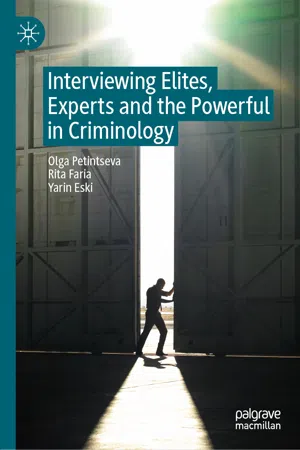1.1 Introduction
By means of interviewing, we enter meaningful interactions with people whose insights, practices, opinions and feelings we wish to study in order to (co-)produce knowledge. Collecting data via interviews enables us to get a glimpse behind the veil of their world and to acquire human understanding of the social realities and values and meanings that underpin them (Beyens, Kennes, & Tournel, 2010; Noaks & Wincup, 2004). Criminologists, especially, have been studying harmful, deviant or criminal behavior, as well as the criminal justice system and the practices of social control, which reside within the obtrusive, the hidden, if you like. Interviewing people who have acquired a certain position within these spheres—whether it is by means of expertise, professional and/or social status requires particular methodological sensitivity. To put it somewhat bluntly, interviewing the powerful presents opportunities and challenges that extend to issues such as access, talking about sensitive topics, negotiating control over the course of the interview and publishing about delicate topics criminologists usually look at.
Although social scientists increasingly conduct interviews with ‘experts’ and ‘elites’, there is very little methodological work discussing their particularities (but see, e.g., Bogner, Littig, & Menz, 2009; Desmond, 2004; Herzog & Ali, 2015; Van Audenhove & Donders, 2019), much less so in criminologically relevant domains. By writing this book, we encourage researchers to engage in ‘researching up’, specifically, by means of interviewing powerful criminals, as well as powerful decision makers in the institutions of social control. Drawing on the body of literature on the so-called elite and expert interviews (hereafter: EEI) (used in geography, communication, political and business studies), the book addresses methodological challenges in interviewing a wide range of actors who may prove to be key informants for criminology and related social sciences: policy makers, politicians, judges/the judiciary, high-level police officers, lawyers, scientists and academics, senior managers, officials from European and international institutions, as well as white-collar criminals or upper world deviants (for instance, people who have committed occupational, corporate, financial, transnational and organized crimes) whose first-hand accounts are rather exceptionally included in criminological research (see, e.g., Barak, 2015; Bittle, Snider, Tombs, & Whyte, 2018; Levi, 2015; Tombs & Whyte, 2007).
Translating methodological insights from the literature on EEI to the domain of criminology and accounting for who counts as ‘powerful’ in this specific area, we highlight the added value of such type of interviews. Moreover, the book guides researchers in designing, carrying out and analyzing EEI, specifically in the areas of crime and crime control. We offer examples, dilemmas, ‘good’ and ‘bad’ practices in order to encourage critical assessment of reader’s own work. Even though EEI do not necessarily differ in all possible respects from other qualitative interviews, particular issues arise concerning access, power imbalances, getting past ‘corporate answers’, considerations of whether or not it is acceptable to ask leading questions or to enter a discussion with the respondent and so on. Our readers will recognize some basic principles from qualitative research interview, but we mainly cross-reference to the existing literature and rather zoom in on the peculiarities of interviewing when it comes to researching the powerful.
In the first place, this book is intended for researchers engaging in qualitative interviews, who self-identify with critical paradigms. Epistemologically, we are much inspired by the principles outlined by Rubin and Rubin (2011) in their Qualitative Interviewing: The Art of Hearing Data. We neither see researchers as ‘miners’, i.e., taking positivist stance that knowledge is simply out there and just needs to be uncovered, nor as ‘travelers’, i.e., a postmodernist premise that knowledge is merely created in the course of (research) interactions (Holstein & Gubrium, 2003; Yeo, Legard, Keegan, & Ward, 2014). We take that knowledge is socially constructed, yet it is valuable outside of the direct research encounters. Still, the researcher guides this process and co-constructs knowledge, which entails that we need to be aware of power relations, interaction contexts, research techniques, self-positioning and the importance of conversation dynamics. While empirically researching the powerful with respect to the issues of crime and crime control, oftentimes researchers cannot participate in the participants’ worlds in real time. Numerous invaluable ethnographic studies aside, scholars regularly have to rely on post-factum reconstructions (or constitutions [Presser, 2009]) of people’s accounts to acquire the necessary information and knowledge. This, again, underscores the importance of careful handling of the interview context and its structured, unstructured and unexpected aspects (Rubin & Rubin, 2011).
Researching the powerful is ‘tricky’ not only when it comes to interview interactions. Arguably, in recent years, contemporary universities—the most privileged loci of scientific research—have been changing their practices and mechanisms in order to better comply with corporate-driven models. This tendency may have a series of consequences for research, namely the need for external funding provided by (politically, economical and socially) powerful entities—precisely the ones that we may want to centralize in our research (Alvesalo-Kuusi & Whyte, 2017; Tombs & Whyte, 2007). Such connections may hinder researchers’ critical perspectives on the most powerful institutions and actors. This context may also, and it has done so in the past, give way to censorship by the powerful and the elites exerted over research results and outputs (Geis & Goff, 1983; Haggerty, 2004; Levi, 2015) or to more subtle ways of defining and steering research agenda.
Moreover, interviewing the powerful presents specific ethical challenges (Haggerty, 2004; Israel & Gelsthorpe, 2017). The actuarial and liability-anticipating logic of university ethics committees (see Faria & Eski, 2018) may make it so that critical research on the powerful becomes hindered or at least subjected to extra scrutiny, potentially limiting its creative and critical aspects.
Add to that the fact that research using qualitative methods, among which open-ended interviews, in criminology has been systematically underappreciated in the contemporary ‘publish or perish’ research culture (for more detailed arguments in this regard, see Copes, Tewksbury, & Sandberg, 2016; Poupart & Couvrette, 2018). Prioritizing survey-like methodologies, in turn, contributes to the fact that the powerful usually escape research endeavors (Agui...
